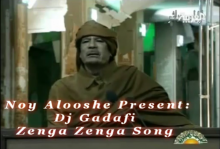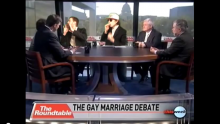Zenga Zenga: Gaddafi's speech remixed as a dance tune
History is marked by the iconic speeches of political leaders like Martin Luther King, Jawaharlal Nehru and Nelson Mandela.
Carefully-crafted words delivered with great conviction before large numbers of people have the power to sway opinion, garner support and unite people in vision and action. But what happens when a leader's rhetoric is not only rejected, but actively used to undermine him?
On 22 February 2011, the late Libyan leader Colonel Muammar Gaddafi gave an hour-long speech in an attempt to regain control of a country that was swiftly turning against him. Massive street protests had already spread across the country. “Shebr shebr, beit beit, dar dar, zenga zenga!” (roughly translated as “Inch by inch, home by home, house by house, alley by alley!”) he shouts, threatening to hunt down the rebel forces trying to overthrow his 42-year autocracy.
Watching this speech on television, Israeli DJ Noy Alooshe knew he had to act quickly. Using video software and Auto-Tune, a tool which can be used to digitally distort voices, Alooshe spliced snippets of Gaddafi's speech with beats from American rappers T Pain and Pitbull's hit 'Hey Baby'. Within 24 hours he had uploaded the mash-up to Youtube, circulated it among key people involved in Facebook and Twitter discussions about the Arab uprisings, and sent it to Arabic media networks. After just one week, the video had been viewed 2.7 million times.
Today the number of views runs to many millions and the video appears in over 30 different incarnations. It's not clear how many Libyans actually saw the video when it first appeared (Youtube was blocked in the country at the time), but some news sources claim that Libyan rebel forces were greeted by locals dancing and chanting “Zenga Zenga!”. The video was, however, very evidently embraced by the rest of the Arab world, with the highest number of views coming from Morocco, Saudi Arabia and Egypt (according to Alooshe in an interview with the Institute for War and Peace Reporting). Although Alooshe says he did receive a few insulting comments, on the whole it didn't seem to matter that the send-up had been produced by a Jewish Israeli.
Similar techniques have been used by the Gregory Brothers, the group behind US webseries Auto-Tune the News. With the slogan 'The only news you need has a bass line', they mash up news footage and soundbytes with their own commentary, and turn them into pop songs. The 23 videos in the series have been watched over 180 million times.
Though the group claims not to have an explicitly political agenda, the videos come across as straight-up political satire. As one of the creators tells the Peninsula Press, “What is outrageous portrayal of the news, or outrageous communication of a political idea, often is what makes a good pop song.” And through pop music they are able to reach a generation who largely don't watch the news at all.
Through skillful and humorous remixing of content that is already in the public realm, these videos create counter-narratives which resist the rhetoric of the powerful, and popularise political critique.
Here are other video examples of the Zenga Zenga theme, curated by blogging community Global Voices.
FURTHER READING
Tribute and comment v. stealing ideas, Free Culture/Creative Mind.
The rhythms of the Egyptian revolutions, Jadaliyya, 2012.
VIDEO
The Songs of Tahrir Square: music at the heart of the revolution, a web documentary by Hussein Emara and Priscille Lafitte, 2012.

